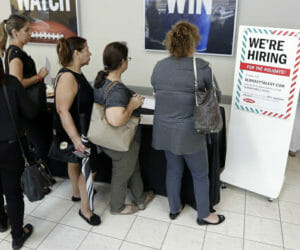Ready … Fire … Aim!
In his latest self-revelatory essay, our resident genius cartoonist tells a tale of triumph over the oppressive forces of consumerism -- or at least the security chief at Barnes & Noble. Call it an origin story, as this incident freed the author to fully become the inimitable Mr. Fish.In his latest self-revelatory essay, Mr. Fish, our resident genius cartoonist, tells a tale of triumph over the oppressive forces of consumerism.
She extended her hand and introduced herself with a smile as Heddy Markel, chief of security, from the Barnes & Noble corporate office in Manhattan. I recognized her name immediately, having heard it spoken in paranoid whispers by fellow booksellers over the previous three years — ever since being hired, in fact, back in 1994 — as if it were a rain forecast. I’d also remembered seeing it mentioned occasionally in the Barnes & Noble weekly newsletter, a stack of which was delivered into the employee break room every Monday morning and thrown away in a stack that was roughly the same size every Sunday night, although I didn’t immediately recognize her face. That would’ve been the case, I’m sure, with anybody from the corporate office, especially without seeing either her front teeth blackened in or a drawing of a cock and balls roosting next to her mouth like an oversized microphone.
As a matter of fact, without the qualifying vandalism etched hard into her face I found her difficult to look at, sort of like seeing Quasimodo without the hump or Woody Allen in contact lenses. With her middle-aged face splattered with enough freckles to suggest a stain consistent with carnivorous animals and an orange, topped by a Dutch boy haircut complete with the fascist bangs of Moe Howard, there was something impolite about looking directly at her. It was as if her attempt to maintain a look that she should’ve given up when she was 11 years old would eventually become so extreme that, in 15 years, she would be just as pitiful to look at as Harpo Marx was when he was nearly 70 and trying to be childish on the “I Love Lucy” show, his gray and sagging skin set beneath a brand new wig that was so dense with shiny synthetic curls that demonstrated a contrast so violent it made one’s teeth hurt to look at it. It was pedophilia somehow without the sex, just the telepathic groping and the desperate grab at happiness that was so indecent and clumsy that it came at the expense of everybody else’s.
I shook hands with her and bent my pity into a boomerang of a smile, just as embarrassed for her white-knuckled grasp on what little youth she had left as I might’ve been had she just come off stage at the Newport Jazz Festival after blowing into the wrong end of a trumpet for 45 minutes, and, following a gesture that she cast like an invisible Frisbee into an empty chair at the center of the tiny office, began to sit down as the door was closed behind me.
“How long have you been stealing money from the registers?” she asked, as matter-of-factly as if she were asking me how many Polacks it took to recognize Adolf Eichmann. Having segued from such a cordial hello, her words fell slowly into my comprehension, like they’d entered my head out of order, as I lowered myself into my chair with all the deliberate confidence of a man being offered a cigarette and then asked if he minded smoking it with his hands bound while wearing a blindfold and hearing the Lord’s Prayer shouted at him from a safe distance.
“Huh?” I said.
“How long have you been stealing money from the registers, Mr. Booth?” she said again, attempting to bully me into taking ownership of her question’s content by attaching my name to it, her sentence spoken with just enough of a Southern accent to seem oddly adorable.
Not wanting to dignify her question with an answer, especially since I wasn’t entirely innocent, having been stealing magazines and newspapers, I said, as if reading from a cue card, my nervousness threatening to short-circuit my vocal cords, “What are you talking about?” I looked over at my boss, Alan, a sweet, thin, small-boned man with a strawberry blond complexion that was fair enough to freckle in candlelight and to burn under a rainbow, who didn’t look up from his desk, ashamed to meet my eyes. As usual, his mind was somewhere else, no doubt 20 miles away in his bedroom closet, and then under his bed, and then in his underwear drawer, frantically searching for his college transcripts to see if he’d taken enough science courses to be able to manufacture cyanide. I looked back at Heddy Markel and said again, “I don’t know what you’re talking about.” She smiled, picking up a manila folder from my boss’s desk and took out a cash refund receipt and handed it to me. “Does that look familiar to you, Mr. Booth?” she said. Twang twang went her accent. It looked like a cash refund receipt, complete with a list of three returned books, the customer’s name, the customer’s address, and the customer’s telephone number, plus, at the bottom of the receipt, on a line asking for a supervisor’s approval, my initials, and below that another line asking for a cashier’s initials, which, for reasons no more salacious than apathy, contained my scribbling of the cashier’s initials. In other words, I supposed that it looked as familiar to me as any small piece of paper meant to remind me of what a fucking bone-crushing waste of time my 20s had been, particularly the last three years spent working in retail.
“No, it doesn’t look particularly familiar,” I said. “Why?” She opened the folder again and took out another cash refund receipt and handed it to me. “What about this one?” she said. I took it. She then turned around and took out another one and handed it to me. “This one?” she said.
“I’m not sure what I’m supposed to be looking for,” I said, really beginning to resent her for trying to coerce me into guessing the details of the misinformation that she had ping-ponging around inside her head.
“Do you feel as if we don’t pay you enough so that you have to steal from the registers?” she asked, no doubt misinterpreting my silence of confusion as the silence of incrimination. Hoping to diffuse the seriousness of the situation and thinking of how meager my paychecks really were, I made the stupid mistake of chuckling. “We have the proof here that you conducted unauthorized cash returns,” she continued, “and forged the customer information. You’re not a little kid, Dwayne, you’re a grown man and you should be able to admit when you’ve made a mistake,” she said.
Suddenly shoved in the direction of a blind rage at being spoken to with such condescension, I forced myself to look her dead in the face and to say, “All right! What do you want me to say? I’ll stop signing the cashier’s initials to the returns, although I’m sure that I’m not the only one who does it. In fact, I know that I’m not the only one who does it.”
“Who else?” she said.
I looked at Alan. I looked back at Heddy. “You tell me,” I said.
“Are you denying the fact that you have been stealing money from the cash registers for the past 16 months?” she said, palms against the desk, real Joe Friday-like, inadvertently tipping her hand to the fact that the incompetence of her office, besides mislabeling me as a robber of money, had taken 16 months to schedule the bogus interrogation of which I presently found myself the subject.
“Sixteen months?” I said, openly mocking the pointlessness of having a watchdog that takes 16 months to start barking.
“Yes, you’ve been stealing money for 16 months, that’s right,” she said.
“I don’t know what you’re talking about,” I said, for the third time.
“So, Mr. Booth, you’re refusing to admit that you’ve been stealing money from the registers?”
“Yes,” I said, “I refuse to admit that I’ve been stealing money from the registers. Can I go now?”
“Hmm,” she said, standing up to look into the manila folder from which she pulled the receipts, as if it contained impossible, yet undeniable, proof of suicide in both Kennedy assassinations. “You understand that by lying that you’re only making it worse for yourself?”
“Whatever,” I said, using the polite version of fuck you without compromising its content.
“OK, Mr. Booth,” she said, closing the folder and moving across the room to stand behind me, “Suit yourself. See to it that he doesn’t leave, Alan.” She stepped into the hallway and closed the door. My boss smiled and shrugged his shoulders.
“So, Alan,” I said smugly, “what kind of a day have you had?” causing him to laugh the sort of laugh that you’d imagine being squeezed out of an empty ketchup bottle just before it’s thrown away. “I’m sorry about all this,” I said, thinking of his wife and two daughters and how, even on a good day, this place sat around him like so much cold water. “Yeah,” he said, laughing out more emptiness before allowing the room to fall into complete silence. I wanted to tell him that I hadn’t stolen any money out of the cash registers, but I decided that making such a statement would’ve been useless in uplifting either one of our moods, figuring that it would’ve been like one guppy saying to another that the appetite of the shark who just left the room was unreasonable. Instead, I simply sat and stared out the window.
Ninety seconds later, the door opened with the subtle click of a switchblade knife and Heddy Markel re-entered the room. Remaining behind me, as in a stickup, she asked, “Excuse me, Dwayne, but you do understand that stealing money from your employer is prosecutable, right?” The question was phrased in such a way as to make any response that I might have seem at least a partial admission of guilt. I took expert hold of my own balls and crinkled up my forehead and said noes.
“I beg your pardon?” she said. “Noes,” I said, without turning around to look at her, instead looking at Alan, who looked at his watch and then at a nonexistent bit of dirt on his shirt sleeve, fiddling with it, and then back at his watch, mesmerized by the thrill ride of his own cowardice.
“Nose–?” she said.
“N-o-e-s,” I said, spelling it out, “noes.” It’s the only answer I can think to give to a question that requires both a yes and a no answer. Yes, answering the literal part of the question, I know that stealing is prosecutable, and no, answering the subtext, I don’t agree with the implication that I deserve to be prosecuted.”
“This isn’t a joke, Mr. Booth,” she said to the back of my head, refusing to acknowledge the absolute seriousness with which I didn’t give a shit about her insistence that she be allowed to remain the only prick in the room. “Employee theft is not funny, and the fact that you think it is gives a lot of insight into why my office has you under investigation,” she said.
“Can I get back to work now?” I said to Alan, ignoring her. “This is stupid. I promise that I’ll stop signing the cashier’s names to the receipts.” Alan looked past me to answer the contempt in Heddy Markel’s eyes with a psychic blow job submissive enough to suggest itself as a spirited rehearsal for putting a gun barrel in his mouth. Markel glared back at him, her gaze cutting through me like an X-ray in search of a tumor that only her incessant searching could cause.
“Mr. Booth, do you have a previous criminal record that the authorities need to know about before we proceed?”
“No.”
“See to it that he doesn’t leave, Alan,” she said before stepping into the hallway and once again closing the door behind herself, presumably to brief the death squad, real or imagined, that she had sequestered in the other room to help with my apprehension.
With my paranoia suddenly yanked out of my body and left to run around the room like a chicken with its allowance cut off, I imagined what she wanted me to imagine: That I had already been tried and found guilty and that I was going to be fired and arrested, and that if I’d only done what she had asked me to do and confessed to a crime that I hadn’t committed then perhaps she might’ve shown some leniency and rewarded me with a much lighter sentence. I wondered why she seemed so hellbent on seeing me swing from the gallows in the first place. Could it be as simple as her department needing to fill a quota? Was she merely scapegoating me because a rat catcher, once the rats become scarce, will begin snatching hamsters and then, after that, stuffed socks fitted with pipe cleaner whiskers, plastic googly eyes and shoelace tails?
Then again, even if I hadn’t stolen any money, I had taken magazines and newspapers without paying for them, so why quibble over the trajectory that my punishment followed to reach me? After all, when an arsonist is falsely accused of drug dealing and put in jail there are just as many acres spared from fire as there would be had the arsonist actually been jailed for arson. But then there was the question of the moral base from which the terms of the punishment originate. Is there ever a situation when stealing is misconstrued to be wrong simply because it is unpopular, like some form of atheism leveled against the god of Capitalism?
I looked over at Alan, who was watching me and biting his fingernails like an animal trying to gnaw itself out of a trap. I looked away and asked myself another question: If a crime is so named a crime because it is a threat to the health and well-being of a society, how effective can the punishment of arrest and imprisonment be in treating the perceived illness? In other words, how does the removal of a single cancer cell act as an effective deterrent against an ailing body’s predisposition to grow cancer cells? I wondered if maybe society itself was the sickness and that crime was merely the antibody released by the immune system to combat the disease of social restraint and large-scale blind allegiance to state power, or what might otherwise be called the buffalo over the cliff mentality. Maybe stealing money from a corporation is always justifiable when the levels of success of corporations are determined by how well they are able to subvert a community’s humanitarian code of ethics and replace it with a demoralizing economic code that makes paramount the importance of an ever-increasing profit margin. I suddenly wondered if maybe I should have been stealing money from Barnes & Noble instead of just magazines and newspapers! After all, if physical starvation is a viable justification for stealing bread, then there must’ve been something starving in my soul that made me feel justified in stealing merchandise. Was it the fact that a huge portion of my week had to be spent engaged in an activity meaningless to me beyond the meager reward of a paycheck — not to mention that it also carried with it the torturous understanding that I was helping to perpetuate a value system that, in the simplest terms, served the upper class by guaranteeing the existence of a vast and exploited lower class? By defining myself as a person worthy of joy and requiring the sort of stark and intimate relationship with the universe that is unregulated by an abhorrent plutocracy, and as a person undeserving of the sort of humiliation that comes from the joyless exercise of having to subjugate all of my personal impulses toward self-fulfillment and self-respect in favor of helping to perpetuate a hierarchical social structure that I despise, it only makes sense that I’d want to cheat those societal filtration systems that hope to limit or qualify my intake of joy and that keep me from feeling the fullness of my existence.
In fact, I suddenly remembered reading somewhere in college before I dropped out how slaves brought to this country often engaged in rampant theft from their slave masters. Most interesting about the theft was the fact that it wasn’t characterized by the stealing of food to prevent any physical starvation; rather, it involved the stealing of the slave master’s personal belongings, perhaps as a way of satisfying the spiritual starvation which came as a result of the slave’s displacement from not only his homeland but also all that defined his selfhood and gave him at least a debatable measure of free will. It seemed as if a self needed to act independently of another person’s expectations (whether they were tyrannical expectations, as in slavery, or merely inferred, as in all the various forms of social etiquette) to recognize its own relevance and to assert its own value and to provide the human being that it belonged to with a definitive center from which to recognize its place in the world.
I had to ask myself: Who were these cruel and bitterly shortsighted sonsabitches who were responsible for maintaining, even nurturing, all the rules for societal conduct that made humanity’s collective concept of itself so goddamn inhumane? Noticing my surroundings and my predicament, I touched an imaginary finger to my forehead and thought, “Here’s someone who I can pin it on. …”
Just then the door opened behind me and then closed again and Heddy Markel, the great emancipator, strode past me with the manila folder that she’d earlier left with. She sat down on the corner of Alan’s desk and looked at me. I looked at her. She then reached into her folder, as before, and pulled out another cash refund receipt and held it in front of me, pointing to the customer information line. “Did you fill this out with your left hand, Mr. Booth?” she said as succinctly as if she were chiseling my last name into a headstone.
“I quit,” I said, as if her accusation had rolled over to me in the form of a soccer ball and I’d bent down and picked it up with my hands, thereby nullifying the rules of the game. There was a moment of confused silence while, rather than standing up and marching out of the room, which was typically what the words called for, I continued to sit in my chair as a way of demonstrating to Heddy Markel a relaxed confidence in my own innocence that existed so contrary to the picture that she was attempting to paint of me that it had the effect of casting her, for the first time, as the untrustworthy presence in the room. All of a sudden, with me as a non-employee, she had absolutely no jurisdiction over holding me there anymore. More precisely, with me an instant civilian, her accusations of theft had no legal recourse, particularly because in order for a civilian to be prosecuted at Barnes & Noble he needed to be caught in the act of committing the crime that he was being accused of and, of course, I was simply sitting in a chair.
Attempting to pull me back to the script, she stood up and put the receipt back into her folder and, like a sore loser reacting to her opponent’s surprise announcement of checkmate, said, “Employee theft is grounds for immediate termination, Mr. Booth. …”
“Termination? I already quit,” I said, standing up to be taller than her. And I was.
Attempting to continue the charade that I was outnumbered and that I should probably confess to my crime before it was too late, she said, “Does Alan have your home address, just in case the authorities need to find you?”
“Yes,” I said, humoring her while removing my name tag, knowing that the authorities that she spoke of were as much of a real threat to me as Aquaman or Wonder Woman or Jesus Christ.
“Alan will escort you from the premises,” she said, which he did, apologizing for nothing in particular the whole way out of the store. I walked back to my apartment in the cooling dusk like a liberated slave, unmoved by the fresh air filling my lungs, realizing that even behind barred windows there’s never any shortage of the stuff.
Your support matters…Independent journalism is under threat and overshadowed by heavily funded mainstream media.
You can help level the playing field. Become a member.
Your tax-deductible contribution keeps us digging beneath the headlines to give you thought-provoking, investigative reporting and analysis that unearths what's really happening- without compromise.
Give today to support our courageous, independent journalists.





You need to be a supporter to comment.
There are currently no responses to this article.
Be the first to respond.